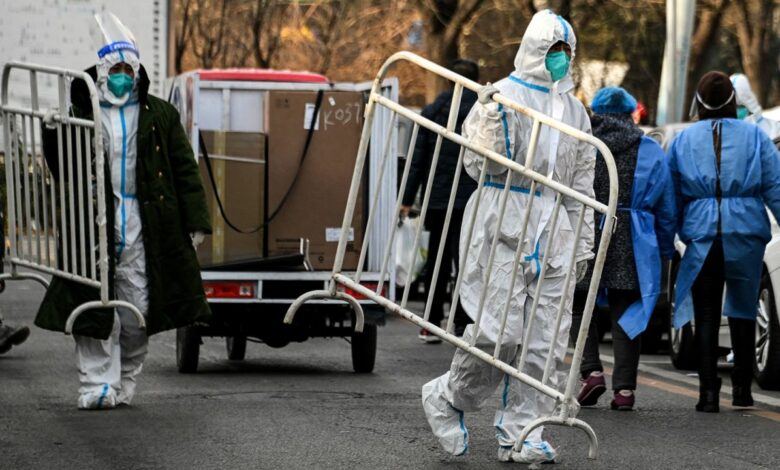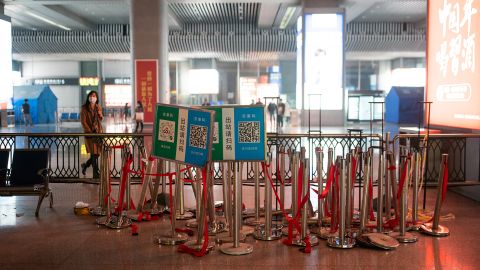
Changes continued Monday as authorities announced a deactivation of the “mobile itinerary card” health tracking function planned for the following day.
The system, which is separate from the health code scanning system still required in a reduced number of places in China, had used people’s cell phone data to track their travel history in the past 14 days in an attempt to identify those who have been to a city with zones designated “high-risk” by authorities.
It had been a point of contention for many Chinese people, including due to concerns around data collection and its use by local governments to ban entry to those who have visited a city with a “high-risk zone,” even if they did not go to those areas within that city.
But as the scrapping of parts of the zero-Covid infrastructure come apace, there are questions about how the country’s health system will handle a mass outbreak.
Throughout the weekend, some businesses were closed in Beijing, and city streets were largely deserted, as residents either fell ill or feared catching the virus. The biggest public crowds seen were outside of pharmacies and Covid-19 testing booths.
Media outlet China Youth Daily documented hours-long lines at a clinic in central Beijing on Friday, and cited unnamed experts calling for residents not to visit hospitals unless necessary.
Health workers in the capital were also grappling with a surge in emergency calls, including from many Covid-positive residents with mild or no symptoms. A hospital official on Saturday appealed to residents in such cases not to call the city’s 911-like emergency services hotline to keep it free for the seriously ill.
The daily volume of emergency calls had surged from its usual 5,000 to more than 30,000 in recent days, Chen Zhi, chief physician of the Beijing Emergency Center said, according to official media.
Covid was “spreading rapidly” driven by highly transmissible Omicron variants in China, a top Covid-19 expert, Zhong Nanshan, said in an interview published by state media Saturday.
“No matter how strong the prevention and control is, it will be difficult to completely cut off the transmission chain,” Zhong, who has been a key public voice since the earliest days of the pandemic in 2020, was quoted saying by Xinhua.
Changes, and concerns
The rapid rollback of testing nationwide and the shift by many people to use antigen tests at home has also made it difficult to gauge the extent of the spread, with official data now appearing meaningless.
Authorities recorded 8,626 Covid-19 cases across China on Sunday, down from the previous day’s count of 10,597 and from the high of more than 40,000 daily cases late last month. CNN reporting from Beijing indicates the case count in the Chinese capital could be much higher than recorded.
One note seen on a residential building in Beijing is indicative of the larger situation, reading: “Due to the severe epidemic situation in recent days, the number of employees who can come to work is seriously insufficient, and the normal operation of the apartment has been greatly affected and challenged.”

The country is only days out from a major relaxation of its longstanding zero-Covid measures, which came as a head-spinning change for many Chinese living under the government’s stringent controls and fed a longstanding narrative about the deadliness of Covid-19.
Last Wednesday, top health officials made a sweeping rollback of the mass testing, centralized quarantine, and health code tracking rules that it had relied on to control viral spread. Some aspects of those measures, such as health code use in designated places and central quarantine of severe cases, as well as home isolation of cases, remain.
Outside experts have warned that China may be underprepared to handle the expected surge of cases, after the surprise move to lift its measures in the wake of nationwide protests against the policy, growing case numbers and rising economic costs.
While Omicron may cause relatively milder disease compared to earlier variants, even a small number of serious cases could have a significant impact on the health system in a country of 1.4 billion.
Zhong, in the state media interview, said the government’s top priority now should be booster shots, particularly for the elderly and others most at risk, especially with Lunar New Year coming up next month – a peak travel time where urban residents visit elderly relatives and return to rural hometowns.
Health authorities on Sunday ordered improvements in medical capabilities in rural areas by the end of the month.
Measures to be undertaken include increasing ICU wards and beds, enhancing medical staff for intensive care and setting up more clinics for fevers, China’s National Health Commission said in a statement.
‘Over-hyping’
Meanwhile, experts have warned a lack of experience with the virus – and years of state media coverage focusing on its dangers and impact overseas, before a recent shift in tone – could push those who are not in critical need to seek medical care, further overwhelming systems.
Bob Li, a graduate student in Beijing, who tested positive on Friday said he wasn’t afraid of the virus, but his mother, who lives in the countryside, stayed up all night worrying about him. “She finds the virus a very, very scary thing,” Li said.
“I think most people in rural China may have some misunderstandings about the virus, which may come from the overhyping of this virus by the state in the past two years. This is one of the reasons why people are so afraid,” he said, adding that he still supports the government’s careful treatment of Covid-19 during the pandemic.
There are clear efforts to tamp down on public concern about Covid-19 – and its knock-on effects, like panic buying of medications.
China’s market watchdog said on Friday that there was a “temporary shortage” of some “hot-selling” drugs and vowed to crack down on price gouging, while major online retailer JD.com last week said it was taking steps to ensure stable supplies after sales for certain medications surged 18 times that week over the same period in October.
A hashtag trending on China’s heavily moderated social media platform Weibo over the weekend featured a state media interview with a Beijing doctor saying people who tested positive for Covid-19 but had no or mild symptoms did not need to take medication to recover.
“People with asymptomatic infections do not need medication at all. It is enough to rest at home, maintain a good mood and physical condition,” Li Tongzeng, chief infectious disease physician at Beijing You An Hospital, said in an interview linked to a hashtag viewed more than 370 million times since Friday.
CNN’s Yong Xiong, Nectar Gan, Xiaofei Xu and Cheng Cheng contributed to this report.




